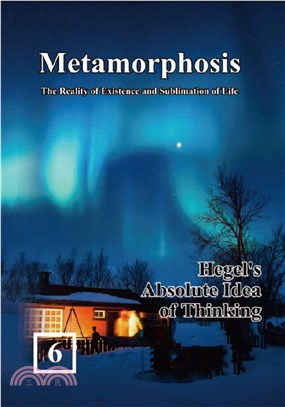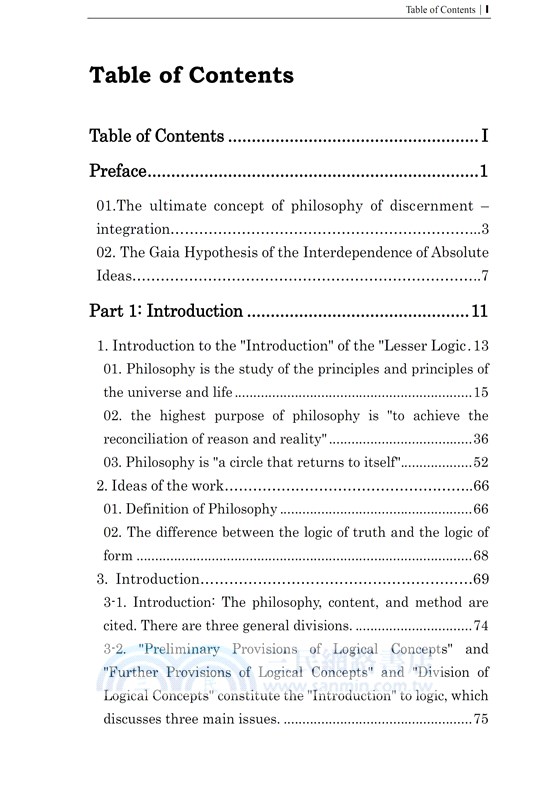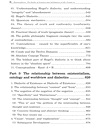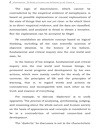蛻變:生命存在與昇華的實相(國際英文版:卷六)
商品資訊
ISBN13:9781647841843
出版社:漢世紀數位文化EHGBooks
作者:張善通
出版日:2023/02/01
裝訂/頁數:平裝/1038頁
規格:22.8cm*15.2cm (高/寬)
商品簡介
If human life is like a special, unusual, significant and far-reaching key, every morning when you wake up to take it, you have to fill out the application form carefully and seriously, without being meticulous.
Before going to sleep at night, thank God for today's gift and return the key to life with gratitude.
If we have used the key of life thousands of times, over and over again, then why do we have to do as Sisyphus did, with great effort, to push a boulder up a mountain?
After pushing a boulder up to the top of the mountain, we let it roll back down again, and so on, day after day, applying and repeating forever. ......
Imagine when we return the key to life, do we take an introspective attitude and examine our life deeply: what have we achieved today? What have we failed?
So one cannot help but ask: which direction should we choose for the existence of the universe and life itself, and what lifestyle should we adopt?
What is the value of the existence of life itself, and what is the true meaning of the existence of life itself?
What if the days of our existence in the universe, in life itself, always begin under such hard-won circumstances?
If our cosmic life existence, our existence itself, has always started in such a hard way and ended in such a sad way, then we must have a deeper self-awareness and reflection on our cosmic life existence, our existence itself.
Therefore, the question of life and death will again become a sharp and sensitive issue.
The Eastern and Western philosophies of life have, for ages, attempted to unravel the mystery of life and death in the existence of everything in the universe itself, in order to understand the true meaning of the existence of the world around us.
They attribute life to the simple "existence" that distinguishes between animals and inanimate things, and to the "mind" that is uniquely human.
It even goes on to use the phenomena that differentiate everything from one generation to another and the various theories that explain these phenomena, in order to decipher the existence of life in the universe.
To decipher the knowledge and culture inherent in the existence of life in the universe. It serves the purpose of the existence and evolution of a certain kind of being itself.
However, "mind" is a sum of the ability to realize the motive by the biological reaction of people through the precipitation and storage of known things.
It is the sum of all the thinking abilities to feel, observe, understand, judge, choose, remember, imagine, hypothesize, and reason, and then to guide their behavior according to it.
Thus, 'mind' covers the 'philosophical' level: the accumulation and storage of the known (subconscious); combined with the 'biological' (consciousness) level of brain information processing, that is, 'physiological response'.
The "mental" activity that engages in the conscious effort to achieve a certain ideal or purpose, thus consciously defining the purpose, is applied to the mental state.
However, the "mind" that can understand its own mental state and that of the human beings around it occurs mostly in the subconscious, and human beings can only receive the perceptible form of the combined manifestation of external feelings through the "senses.
The imagination compares and categorizes the perceptible forms, and the similar perceptible forms are grouped into one impression, and the perceptible forms begin to appear.
This assertion is in fact a statement of a very important fact, that although man has the ability to be autonomous, to master himself and to realize his own existence, he is the only one who is able to do so by reason.
In other words, man is the only being who exists in the way of rational "being", but the human brain does not automatically produce consciousness.
Consciousness is formed only when objective things are reflected to the human brain and processed by the human brain.
In other words, the attempt to uncover the true meaning of the existence of the universe and life itself is a constant and unchanging opportunity to establish the inner reality of the self.
If one does not seek deeper into one's own consciousness to establish an inner reality that one can grasp and that is hidden in one's heart.
Then, the inquiry into the existence of life in the universe, the true meaning of existence itself, will only be transformed into the pursuit toward the existence of things outside of the body, but not in the establishment of the inner value of the human self.
Therefore, the existence of life itself can only be grasped by consciousness through inner experience and intuitive methods.
The external factor can only work by revealing the substance of what is hidden inside things to all objects or phenomena that exist objectively in nature.
Reason can only grasp what is static enough to understand natural phenomena, but it cannot grasp the universe, human nature, or human spiritual culture.
Therefore, it is necessary to give prominence to will, emotion, and intuition in the field of philosophy of life and psychiatry in order to avoid the negation of humanity, personality, and freedom of will.
And in Leibovich's post-Nietzschean philosophy, it is from the radical aesthetics of the Stefan Georges school to the "life" phenomenon of existence itself as a whole, the existence of the universe life life itself.
The existence of life itself is always the core of the philosophy of life, and the existence of life itself is always the core problem of all cosmic life and life itself.
To sum up, if we can examine life deeply with a reflective attitude, and see things with wisdom, and look at the universe and the world quietly.
We will easily find that the inquiry of natural science in Western culture can be explained by the universal law of cause and effect; the study of psychiatry is the understanding and experience of the meaning of the existence of life.
Arthur Schopenhauer (1788~1860) and Friedrich Nietzsche (1844~1900) opposed the suppression and alienation of human emotions by rationalism and mechanism, and affirmed the importance of the "will to live" (Wille zum Leben).
Since human consciousness is not under the impact of rational control and flows freely like water, existentialist philosophers of life, such as Socrates, Plato, ...... Kierkegaard, Schopenhauer, Hegel, Nietzsche, Heidegger ......, etc.
What is the interpretation of the existence of life, the stream of consciousness of human meaning, the will to live as the essence of life, and the strong will as the origin of existence, or the highest value standard?
The Oriental "Phenomenology of Consciousness" explores the phenomenon of "using psychological knowledge to record the experience of the development of human psychological consciousness without limitation, or only subconsciously.
What kind of interpretation can the Eastern cultural philosophy of life offer to the question of the true meaning of the existence of life in the universe? "Consciousness" is a "fleeting phenomenon of life" in space and time.
How is it that "the phenomenon of existence is the essence of life", as Husserl says, and how is it that "consciousness" is a "phenomenon of life", as Jean-Paul Sartre says in "Being and Nothingness"? How to translate "Being and Nothingness" by Jean-Paul Sartre or "Being and Time" by Heidegger into "Tao" as the origin of the universe by Laozi (Li Er) from the East?
It is also a test of "this is, therefore, the other is, this is born, therefore, the other is born, this is not, therefore, the other is not, this is not, therefore, the other is not", and the possibility of cultural exchange, dialogue and integration between East and West is sought.
Therefore, in the book "Metamorphosis", we take the perspective of "consciousness" to know the "movement" of the body by chanting the head meditation "movement" and the "cessation" of the body by chanting the head meditation "cessation" to understand the true experience of birth, dwelling, change, and death of the body and mind.
Seeking the truth that is objectively discernible and exists independently of itself." The truth of "actual existence and non-nothingness" is the clarification of "the true appearance of the existence and metamorphosis and ascension of life.
It is the translation of "the true face of the existence and metamorphic ascension of life. Eight themes are presented through four stages of "confusion and search - perception and interpretation - awakening and breakthrough - metamorphosis and sublimation". The Unsolved Mystery of Life; The Awakening of Existentialism in East and West; Jasper + Kierkegaard + Martin Buber's Philosophy of Life; Heidegger's Temporal Transformation; Schart's Existence and Hegel's Negation of Negation; The Metamorphosis and Sublimation of Transcendental Life; and The Reality of Truth Unveiled.
However, no real answers will be given during this book's inquiry into the reality of truth, but you will be guided to straightforward ideas that will emerge quickly without much thought process. It will help you look at your life and analyze your problems.
From your own perception beyond all objects or phenomena in nature and the external material world, the process of self-awakening and contradiction will help you discover the problems in your life. The discovery of problems from self-awakening will eventually lead to the true unveiling of the mystery of the existence of life itself.
作者簡介
●About Author●
Shan Tung Chang's Professions:
▼Vocational Trainer, Shek Pai Chun Hing Hospital
▼Professional Land Agent
▼Taiwan Taoyuan District Court Clerk
▼Publications:
1. A Revolution Beyond Death
2. The true meaning of life's existence and metamorphosis and sublimation (8 volumes)
3. Translation of Cheng Wei Shi Theory (10 volumes)
4. The Lanyan Sutra Explained (10 volumes)
5. Interpretation of the Lankan Sutra (10 volumes)
6. Interpretation of the Sutra (8 volumes)
7. The Interpretation of the Treatise on Chinese Buddhism (10 volumes)
8. Interpretation of the Sutra of Prajna Samadhi (3 volumes)
9. The Interpretation of the Mahayana Initiation of Faith (3 volumes)
10. Interpretation of the Dharma Flower Sutra
11. Interpretation of the Vimalakirti Sutra (3 volumes)
12. Yuan Jue Jing Explanation (2 volumes)
13. Vajradhara Interpretation
14. Anapan Shouyi Sutra Explanation
15. The Eight Senses of the Law
16. Explanation of Mahayana's Five Noble Truths
17. The Hundred Laws of the Name of the Gate Explained
18. The Twenty Verses of Vaisnava
19. The Thirty Verses of Vaisnava
●張善通簡介●
石牌振興醫院職業訓練師
土地專業代理人
台灣桃園地方法院書記官
著作:
1《超越死亡的革命》
2《生命存在蛻變的真諦》(八冊)
3《成唯識論釋義》(十冊)
4《楞嚴經釋義》(十冊)
5《楞伽經釋義》(十冊)
6《解深密經釋義》(八冊)
7《中觀論釋義》(十冊)
8《般舟三昧經釋義》(三冊)
9《大乘起信論釋義》(三冊)
10《法華經釋義》
11《維摩結經釋義》(三冊)
12《圓覺經釋義》(二冊)
13《金剛經釋義》
14《安般守意經釋義》
15《生命《八識規矩頌釋義》
16《大乘廣五蘊論釋義》
17《百法名門論釋義》
18《唯識二十頌釋義》
19《唯識三十頌釋義》翻譯
目次
Preface
01.The ultimate concept of philosophy of discernment - integration
02. The Gaia Hypothesis of the Interdependence of Absolute Ideas
◇Part 1: Introduction◇
1. Introduction to the "Introduction" of the "Lesser Logic
01. Philosophy is the study of the principles and principles of the universe and life
02. the highest purpose of philosophy is "to achieve the reconciliation of reason and reality"
03. Philosophy is "a circle that returns to itself"
2. Ideas of the work
01. Definition of Philosophy
02. The difference between the logic of truth and the logic of form
3. Introduction
3-1. Introduction: The philosophy, content, and method are cited. There are three general divisions.
3-2. "Preliminary Provisions of Logical Concepts" and "Further Provisions of Logical Concepts" and "Division of Logical Concepts" constitute the "Introduction" to logic, which discusses three main issues.
4. The main content of the system of logic.
1. Existence theory.
2. Ontology.
3. Conceptualism.
Appendix : Hegelian Dialectic
01. Definition
02. Modern Period
◇Part 2: "Preliminary Provisions of the Concept of Logic◇
(1) Logic is a form of thinking that reflects the intrinsic properties of objects
1. The main task of logic is to teach people to think correctly
2. Self-existence between truths
3. Imperfection in life is the norm, and perfection is the exception
4. Only the spirit of thinking can know the spirit
5. Thought is the only activity that experiences truth and supreme existence
6. The three basic forms of abstract thinking
7. Abstract logical thinking has a deeper meaning than formal thinking.
8. Consciousness has the power of conscious thought
(2) The characteristics of consciousness and thinking on the reflection of objective things
First, thought is dynamic and universal
Second, through reflection to generate universal concepts
Third, reflection changes the form of perception or sensation and grasps the essence behind it.
Fourth, the activity of thinking is the activity of the self, that is, the state of freedom
(3) Small logic (the preliminary rules of the concept of logic)
(1) Ideas are dynamic universals
(2) Generating universal concepts through reflection
(3) Reflection changes the form of perception or sensation and grasps the nature behind the perception
(4) The activity of thinking is the activity of self-awareness.
(5) Sensuality is not necessarily illogical, but is a form of intuitive perception.
(6) The two contradictory and unified attributes of relative and absolute things themselves
(7) Principles and Standards of Valid Inference and Proof
1. Objective dialectical thinking, a dialectically correct reflection of objective things
2. Superconsciousness cannot exceed the limit - 'limit concept'.
3. Self-awareness of the self in the process of contradiction with the external material world
4. Self-awareness", "Self-experience" and "Self-control
5. Original sin is the starting point of human civilization and the beginning of the reproduction of future generations through sexual love.
6. The nobility of man lies in the universal principle, from which he is no longer free.
7. The reflection of the objective world is hidden within but not revealed
◇Part 3: The main content of Small Logic.◇
I. Existentialism.
1. Intrinsic properties of thought and "being as being
2. All things are the specific unity of quality and quantity
3. Agnosticism is the blind spot of scientific knowledge
4. The logic of the hypothesis seems reasonable, but the conclusion is self-contradictory
5. Chain paradox and continuum fallacy way of thinking
6. Inquiry into existence is the study of the concept of 'self-contained' or 'potential paradoxes'.
7. The stages of absolute idea development are divided into "quality", "quantity", and "scale".
II. Ontology.
1. The essence, that is, the position on which the analysis of the reflection study is based
2. The fundamental properties inherent in the thing itself: characteristics
3. The distinction between philosophical "renunciation" and metaphysical "negation
4. The nature of things is the true nature of things
5.The scope of the concept of agnosticism's "prepositions
6. Essence - "ceasing to exist, abolishing and ascending to a higher level
7. Theory of scope is the most fundamental cornerstone of divergent thinking
8. 'Knowing' thinking, a complex unity of multiple elements.
9. The essence is "fixed" based on cognition, beliefs and judgments.
III. Conceptualism.
1. A form of thinking that reflects the nature of things
2. Concepts are the accumulation of piles of constantly metamorphosing and sublimating present situations.
3. The standard of truth is eternal and unchanging
4. Absolute Idea as the unity of "existence" and "essence
5. The Absolute Idea is logically prior to nature
01. "Absolute idea" is self-contained and self-contained in its own identity
02. "Absolute idea" is the principle of all life
05. "Knowing" is the cognition between "sensibility" and "rationality"
06. Reason is inferior to the will and attempts to leave ground for religious beliefs
07.The Absolute Idea is the unity of Being and Essence
08. Definition of "absolute idea" understanding
09. Identify the relationship between understanding, concepts, and problems.
6. "Predeterminism" is an assumption of deviant cognition
7. The conceptual theory can be divided into three parts
IV. Logical Thinking is a necessary process for understanding existence
01. Different ideologies are always objectively unified
02. The essence is the world of ideas in which things necessarily exist
V. Conclusion
◇Part 4: The idea of Hegel's absolute concept◇
01. Understanding Hegel's dialectic, and understanding "integrity" and "abandonment
02. Hegel's Dialectic
03. Quantum mechanics
04. The theory of truth and conformity (conformity theory).
05. Practical theory of truth (pragmatic theory)
06. The public philosophy fragment example two: the unity of contradiction
07. Contradiction - caused by the superficiality of one's knowledge
08. Conde and the Twelve Domains
09. Absolute Concept Theory
10. The boldest part of Hegel's dialectic is to think about history in the "absolute spirit".
11. Conceptualism - Kant: A + B
◇Part 5: The relationship between existentialism, ontology and worldview and dialectics◇
1. Dialectic of Existence or Dialectic of Existence
2. The relationship between "content" and "form"
3. The negation of the negation of the negation
(1). "Specificity" and "Distinctness"
(2). The relationship between "thought" and "concept"
(3). "This is" and "the problem of the relationship between thought and existence
(4). Concrete thinking and abstract thinking
(5). The four causes say
4. 'Cause', 'reason', and 'explanation'
(1). Subsequent Development
(2). Causality
(3). Psychology
(4). Tool use
5. Evolutionary Psychology of Religion: The Evolutionary Origins of Religion
(1). Study of the universe, principles and principles of life
(2). The study of Western philosophy Western Philosophy
(3). The positions on which the analysis of religious studies is based
6. Cause and Effect
7. The connection between cause and effect
8. Metacause - the philosophy of conditions that cause another event to occur
(1). A priori
(2). A posteriori
(3). Methodological naturalism and metaphysical naturalism
(4). Naturalism and Spiritual Philosophy
(5). Analytical Criticism and Judgment
9. The theorem we want to establish is ---- stipulates first, then exists.
(1). Concrete and Abstract
(2). The rise of thinking from rational abstraction to rational concreteness
10. The Subject of Existence
(1). This state of unfolding is the essence of the meaning of "this".
(2). The first anecdote
(3). The second anecdote
(4). A theory cannot be without practical connotations.
(5). Nature, mission, inquiry, and the ultimate purpose of history
主題書展
更多書展今日66折
您曾經瀏覽過的商品
購物須知
為了保護您的權益,「三民網路書店」提供會員七日商品鑑賞期(收到商品為起始日)。
若要辦理退貨,請在商品鑑賞期內寄回,且商品必須是全新狀態與完整包裝(商品、附件、發票、隨貨贈品等)否則恕不接受退貨。
































































